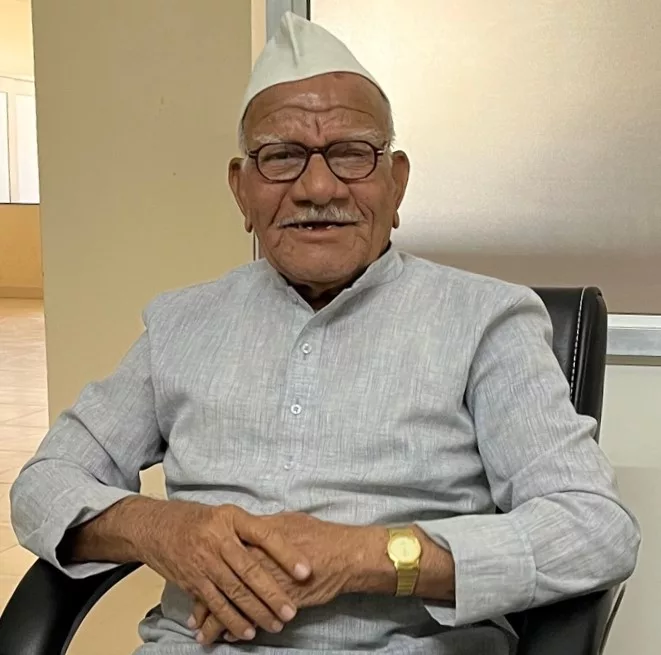
Sevagram in the 1970s had a canteen that served as a bustling hub of activity for students, staff, and visitors. The canteen provided a space where people could grab a quick bite, catch up on the latest gossip, or simply enjoy Babulalji Ganvir’s generosity. If there’s one thing that people remember Babulalji for, it’s his extreme generosity with his money, time, and effort.
I am talking about Babulalji Ganvir. Generations of medical students can vividly recall the culinary delights— the aaloo bonda and the Badshahi Chai— that his canteen offered. His bondas proved the adage that the best way to reach a man’s heart is through his stomach.
Those who studied medicine at MGIMS during its early years developed a special relationship with Babulalji. And who could describe Babulalji better than the inimitable Kishore Shah (MGIMS class of 1974) who when requested to pen the life and times of Babulalji wrote:
The Art of Giving: Insights from the Village Samaritan
“Babulal Ganvir, the ever-smiling orange face. Yes. As if he was from royal blood, his face always had that peculiar radiant orange tinge.
And the smile never left his face, even at times of adversity. His son was not faring well in school. He smiled and said, “जे व्हायचं ते होईल” and gave his patent wide smile.
Decades later I was at a conference in Sevagram. Dr Dilip Gupta kindly took me to the village to meet the legend, Babulal himself. He had just been operated on for cataracts and had his goggles on. He peered carefully at me, shielding his eyes from the sun and said, “मोरु ची मावशी,” This was a nod to a support hit drama role that I had done during my student days. Such a sharp memory.
Babulal ji was a father figure to us in our college days. He lent money to many of my colleagues when their money order was late. Those were the times when UPI money transfer was unheard of.
His motto was then, and has always been:
उधारी ही मैत्री ची चिकट पट्टी असते.
During our simple times, money was not the only thing that we owed Babulalji.
*****
A day before, I interviewed Babulalji in the Medicine department of our hospital for a lengthy profile I planned to write about him. After finishing my rounds with the ICU patients, I had some time to spare. Despite his advancing age, Babulalji impressively kept his mind sharp throughout our two-hour-long conversation as he recounted his life story to me. The following is his story, in his own words.
The First Tea Stall
Back in 1962, a young 24-year-old Babulal started his tea stall in Sevagram. He spent his childhood in the Gandhi Ashram, where his favourite toy was the spinning wheel, and he enjoyed cleaning the toilets. To make a living, he later sold coarse white khadi in Nalwadi. He named his canteen Uphar Grih, a name that he continued to use for all of his subsequent canteens.
At the time, patients admitted to the 15-bed Kasturba Hospital, along with their relatives, desperately searched for a cup of tea since there was no canteen in Sevagram. A Sindhi friend from Wardha suggested to Babulalji that he sell tea near the hospital. So he set up his tea stall on Ashram Road, near the old hospital.
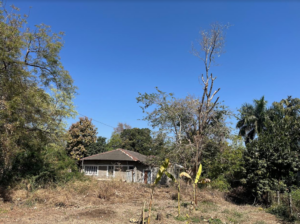
During those days, Ramdas Gandhi, Mahatma Gandhi’s third son who passed away in 1969 at the age of 72, would often visit Babulalji’s tea stall. Since the canteen lacked tables and chairs, Ramdasji would sit cross-legged on a mat and savour the shev, a savoury snack that Babulalji meticulously prepared. He enjoyed it so much that he would order another plate, pay twenty-five paise for each, and bring it with him to Delhi to relish at his leisure.
Time to Move out
Several years went past. Dr. Sushila Nayar, the director of MGIMS, spotted Babulalji selling tea on the roadside, even though there was no road there at the time. “I don’t like shop owners selling their products on the road,” she remarked. She asked Manimala Chowdhury to find a room where he could make and sell tea. The only available unused room in the hospital was the mortuary, where dead bodies awaited funerals. Without hesitation, Babulalji spent Rs 13.50 to set up his shop in the mortuary room.
A few months later, a Sindhi patient from Wardha suggested that Babulalji enhance his canteen’s menu by adding some snacks. “You could attract more customers if you served hot pakodas,” he advised. Babulalji replaced his old stove with a Bhatti and began mixing gram flour with sliced onions and spices to create a thick batter that he would then deep-fry to perfection. He hired an assistant and taught him how to prepare Chai, Pakoda, Batata Vada, and Samosa.
Third Location
“A true warrior, like tea, shows his strength in hot water,” so goes a Chinese proverb. Now that Babulalji was in deep trouble, he had to learn life lessons from the perfect pots of tea he had been brewing for a long time.
In 1969, MGIMS was born. Babulalji was asked to vacate the room because the dean wanted a place for its staff. Babulalji suddenly found himself left high and dry. His business had picked up and the very thought of moving elsewhere unnerved him.
For a while, Babulal was so distraught he couldn’t put the teapot on the stove. In time, though, destiny put him in touch with a person who helped him put the problem aside, and he began to brew tea again.
Prabhakarji was the chief of Kasturba Hospital Sevagram in the fifties and was in charge of the Mahadev Bhavan Campus in 1969 when he heard about Babulalji’s situation. He was surprised to learn that Manimala Choudhary, the secretary of the KHS, had asked Babulalji to vacate the shop. Prabhakarji offered him an alternative location on Ashram Road, just 100 metres from the old hospital.
A few years later, Dr Sushila Nayar asked all the roadside shops to move into the new Seth Mathuradas Mohota Dharmshala. She offered him a new location. Babulalji was not interested. She also hinted at a job in the medical college. He didn’t want that either. His petty tea shop kept him meaningfully engaged. He met people of every hue. He was earning enough and enjoying his work. He didn’t like this storm in his teacup.
“You will have to go into the new premises that we are offering. We are planning to put all roadside shops into the new block. Once you all start your businesses there, you would earn enough to forget your roadside shops,” Dr. Sushila Nayar was straight and stern.
He had no courage to protest. He moved to the new premises. Mr Girdhar bhai Doshi and Khemchand also started their grocery shops in Dharamshala, as did Chintaman, the barber.
On June 18, 1976, Babulalji’s tea shop was relocated to two rooms on the ground floor of Seth Mathuradas Mohota Dharamshala, Sevagram Square. Despite the challenges he faced, Babulalji’s tea business continued to thrive, and he enjoyed his work, meeting people from all walks of life.
Finally, Babulaji finds a nidus
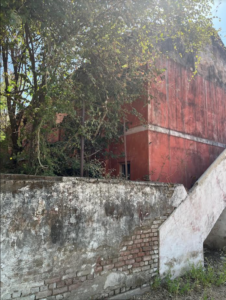
Babulalji’s canteen served basic food items like meals, snacks, and tea, featuring dishes such as puri bhaji, poha, samosa, aaloo bonda, and chai. As his business grew, he hired additional staff to help run the shop. Together, they expanded the menu and enhanced the quality of the snacks. In those days, a cup of tea cost only 25 paise. Babulalji ensured that he treated his employees fairly and respectfully, which fostered a strong and loyal team. The food joint now provided breakfast, lunch, dinner, and snacks. Through his dedication and hard work, Babulalji transformed his small shop into a flourishing and prosperous business, largely due to the support of his devoted team.
The Man Who Changed our Lives: Tribute to a Village Philanthropist
Babulalji’s canteen was more than just a place to grab a quick bite or a cup of tea. It was a hub for students, staff, and businessmen from Wardha, where they could catch up on the latest news, play cards, and share stories. Everyone who visited felt welcomed and comfortable, as Babulalji would listen to their problems and offer words of comfort and support.
Over time, his canteen became an integral part of Sevagram’s life, attracting people from far and wide who wanted to taste his famous masala chai and signature dish, the aaloo bonda. Babulalji took great pride in his food and spent hours in the kitchen perfecting his recipes. He even maintained a register for his customers, categorising them into batches and allowing them to clear their bills at a later time.
“I began to maintain a register. Medical students were categorised into batches; each batch would have a separate register. Students would come to my hotel, pick up recipes with their own hands, and make suitable entries in the register. I would seldom try to verify the accuracy of the numbers that they wrote.”
Despite his success, Babulalji remained humble and compassionate, endearing himself to the medical students by lending them money at zero interest rates and never reminding them to repay their loans. At 11 am, he would even shut the shop for non-medical customers for an hour, giving the students and doctors exclusive access to the canteen. The girls would eat snacks in the kitchen, while the boys would do so outside, with the girls usually paying their dues and the boys often asking for credit.
The Struggle Continues
In 1984, local authorities asked all shop renters in Dharmshala to vacate the premises, including Babulalji’s canteen. This posed a significant challenge as Babulalji developed a loyal customer base and established relationships with stakeholders in the area. Despite the difficulties, Babulalji displayed remarkable resilience and creativity in overcoming obstacles.
He relocated his tea shop to Sevagram square, which had two diverging roads leading to Karanji Bhoge village and Kharangana (Gode) village, with a culvert in the centre. Babulalji constructed a makeshift shop using wooden planks across the culvert and ran his business from there for the next decade. However, as the hospital expanded, Sevagram square was re-designed, the culvert was diverted, and new roads were planned.
In 1994, after ten years of running his tea shop from makeshift premises, Babulalji decided to close shop for good.
The Aaaloo Bondas
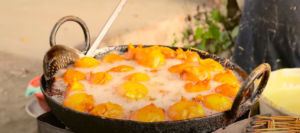
“Your aaloo bondas are renowned far and wide. To whom do you credit the secret of your recipe?” I asked Babulalji. Babulalji proceeded to divulge his secret, saying, “The Samadhan Hotel in Wardha was famed for their aaloo bondas. I began visiting the hotel and closely observing the cook’s preparation of the dish. I carefully noted the clever use of boiled potatoes and spicy batter to create the delectable aaloo bondas that were served to the customers. I replicated the recipe, and soon my aaloo bondas surpassed even those of the Samadhan Hotel.”
Dr Kishore Shah attests: “The rich and indulgent tarri made with boiled gram and generous amounts of cholesterol was our daily guilty pleasure. The large-sized aaloo bonda would float in the savoury gravy and make our mouths water. Babulalji’s menu was simple – bonda and tea – but what a taste it had! Anyone who tasted his bonda became a lifelong devotee. And if you dared to ask for coffee, he would gaze at you as if you were from another planet.”
“He has one exceptional quality that I never realized when I was a student, but in today’s commercial world, it seems like an outdated anomaly. Babulalji’s canteen never had a signboard, and it was constantly packed with students. No advertisement was required,” he adds.
The Benevolent Badshah
With the passage of time, MGIMS progressed and transformed, but Babulalji’s canteen remained an unwavering constant. It was a sanctuary for both students and faculty, a place where they could seek solace and comfort, and where Babulalji’s delightful cuisine and warm smile were always available.
“My hotel soon became Babulal’s Bank as well. My shirt and pyjamas were equipped with five pockets, each stuffed with a substantial amount of cash. Medical students would frequently approach me for a loan, stating that they needed to pay an exam fee, purchase a train ticket to their hometown, or simply watch a movie in Wardha.”
“I never refused. Nobody ever departed from my shop disheartened.”
Over time, Babulalji gained a reputation as the most generous moneylender in Sevagram. Students would leave their hostels to request funds from him, knowing that he would treat them with compassion and empathy. As time progressed, a strong bond of amity and admiration was established between Babulalji and the students.
Living Legend: Tales of a Man Known for His Empathy and Generosity
“Through oversight,” writes Dr Kishore Shah, “I left Sevagram without paying his back dues. When I returned after a year for a conference at Nagpur, I made it a point to come to Sevagram especially to clear Babulalji’s dues.”
“He did not once rebuke me or say a harsh word. His smile intact, he just pocketed the cash without counting and said, “Have a Bonda and Badshahi tea. This time it’s on the house.”
There were several such instances. One day, two medical students approached Babulalji for a loan. They had fallen on hard times and had run out of money. They needed money to appear in the university exams and to clear their hostel dues, or they would go a semester behind their classmates. Despite knowing that both were unlikely to be able to repay the loan, Babulalji agreed to lend them money. He knew that medical students had fallen on hard times, and he didn’t want to see them suffer.
A few months went by. Both medical students successfully cleared their exams. They finished their internship too and left MGIMS. A typical moneylender would have repeatedly reminded them or would have called their parents, but Babulal didn’t.
Such stories of Babulal’s kindness and compassion spread quickly throughout Sevagram. Medical students wouldn’t hesitate to approach him for loans. Babulal continued to lend money at zero interest rates—helping them cope with the harshness of resource-limited life.
Once two doctors from Nagpur and Kolkata came to Sevagram years after they had graduated from MGIMS. “We owe you some money— it ran into tens of thousands—that you had lent us years ago but never asked us to return. Today, our conscience asked us to personally see you and pay the debt,” they explained after they exchanged pleasantries with Babulalji.
“I don’t remember if I ever gave them some money. But they did. They again asked for, and relished, my tea and aaloo bonda. They paid all their dues. And as they waved goodbye to me from their car window, I could see tears welling in their eyes,” Babulalji’s eyes also got teary as he recalled the event.
Babulalji’s kindness and compassion had a profound impact on medical students. So much so that whenever MGIMS batches come for their silver or golden jubilee reunions, they make it a point to honour Babulalji, and walk down memory lane with him. Babulalji may have been a simple canteen owner and a moneylender, but he was much more than that. He was, and still is, a friend, a mentor, and a source of hope for all those who knew him.
Babulalji’s legacy lives on, even after he retired. The students who had once studied and worked at the medical college never forgot their experiences there, and the memories of Babulalji’s canteen remain with them always. To this day, they speak fondly of their time at MGIMS and the role that Babulalji and his canteen played in their lives.
MGIMS students realize that Babulalji was not just a moneylender, but a friend and a saviour. His compassion and generosity made him an integral part of their life. His example of kindness and compassion has inspired countless others to be more giving and to help those in need: Girdharbhai Doshi (Bhagwati Kirana), Jagdish Gutta (Madras Hotel), and Gulabsingh Baghel (Sevagram General Store) as an example. Loved and respected by all, his name has become synonymous with generosity and selflessness.
“No Dues” from Babulal Canteen
Dr Sushila Nayar, Manimala Chowdhury and later Mrs Kamla Desikan would frequently pass by my shop as they would take their morning rounds. Sushila Behenji was told that I was liberally lending interest-free loans to medical students. “How much do my medical students owe you? She asked me. “Rs forty-two thousand,” I replied. She couldn’t believe her eyes. It was a very big sum those days.
“Have you gone crazy? Do you think you have become rich enough not to bother about this bad debt,” she scolded me in her Punjabi Hindi.
“No, Behenji, ” I replied politely. This is business. You gain some, you lose some. Medical students lack money, but not honesty. It takes time but they do pay me back what they owe me. And even if some of them can’t, it hardly bothers me. I began with barely Rs thirteen and today my customers owe me forty-two thousand. The almighty has given me enough; now it is my duty to reciprocate.” I replied.
Dr Sushila Nayar was nonplussed. She stood there wondering how naive and innocent a shop owner could be. Determined not to let her medical students exploit his gullibility, she asked the Dean to prepare a form that mandated a “No Dues” clearance from him before students took a university exam or left the institute.
Thus, was born Babulal’s “No Dues” stamp. Soon, Babulalji realised that try as hard as they might, some medical students simply had no money to pay their dues. He didn’t want to stand between them and their exams. He would simply sign and stamp the “No dues” form, clearing all their dues on paper. And he kept no track of who paid him what and when.
Babulalji’s Life Story
Babulalji is now 85 He still walks briskly and he radiates a vitalizing energy, the zest and gaiety of an inexhaustible joie de vivre.
Born to Motilalji Ganvir and Bakhubai Bhongade on 1 August 1938 in Sevagram, Babulal was the second of five siblings—two brothers and two sisters.
A year before Babulal was born, Mahatma Gandhi visualised a need for Nai Talim (New Education, also known as Basic Education) for a new social order. Babulalji’s parents worked for Hindustani Talimi Sangh in Sevagram Ashram, living a life of toil. He was brought up in Sevagram—dotted with traditional homes made of mud and thatch, and the air filled with the fragrance of cow dung. Babulalji gave all his 85 years to Sevagram—he did his schooling at the Zilla Parishad School and the Nai Talim School.
Back in 1967, M Shankaran, who worked at Sevagram Gandhi Ashram, sent Babulal to Nasik with a letter to Khadi Gramodyog asking for some work. The idea was to help Babulal earn some money. To Babulal’s surprise, Mr LR Pandit, who was associated with Sevagram hospital, was also present in Nasik. Mr Pandit wasted no time in assigning khadi-related work to Babulal. This training proved invaluable as it helped Babulal learn the tricks and tips of the business.
“In Nai Talim, from dawn to dusk, we would learn by doing it—spinning, weaving, cleaning and farming. This manual work, an important part of the school, helped me to develop physical strength, manual dexterity, and practical skills. I also learned how to stay calm amidst adversities and live a simple and self-sufficient life,” Babulalji described how the Ashram days shaped his life.
“There is one very important aspect of Babulalji, which I never realised when I was a student. But in today’s commercial world, it would seem rather a quaint anachronism. Babulalji’s canteen never ever had any sign board. There was no need for it. It was perpetually crowded with students. No advertisement was required.” writes Dr Kishore Shah.
In 1994, he shut his canteen. His sons replaced it with a photocopying shop, an STD booth, a gift centre and a computer shop. Until recently he would regularly walk down the road that led to his shop. Now he prefers home to the shop.
The Heart of the Village: One Man’s Story of Kindness and Altruism
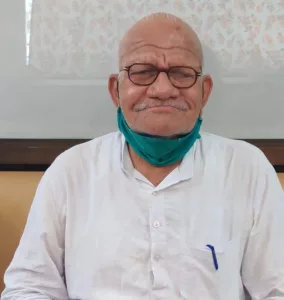
“A childhood injury had left Babulalji blind in one eye. Thus, he saw only a two-dimensional world. But I think his world was only one-dimensional. There was only good in his world. So, his method of account keeping was simple. You ate when you were hungry and you paid when you had the money. I have never seen him ask any student for back dues. Never ever in my life have I seen a man with so much disdain for money, but who was so rich in humanity,” writes Kishore Shah.
What made me write about Babulalji today? Because I believe that his story is a testament to Mark Twain’s adage that kindness is a language which the deaf can hear and the blind can see. A gesture that satiates the hungry and quenches the thirsty. The present generation of medical students might not know him, but ask medical students of the 70s and the 80s if they would have survived Sevagram sans Babulalji, sans his canteen.
They would shake their heads, disapprovingly.
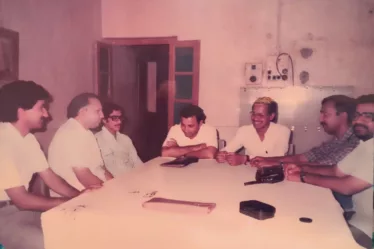
Sir, was he allowed to notarize documents? I remember a story about it.
Wonderfully crafted draft Sir. It was like a movie with so many characters very familiar to us.. 👏👏
We remember him as our gazetted officer.. All attestations was done by him.
Beautifully written story.You have done commendable job.
Very good narration. I would like to add few words. He used wear a torned zabha of khadi. He was our ATM .He knew each one by name of 69 batch.
I may have not eaten his aaloo bondas or sipped his Badshahi chai but after reading the comments, I remember him attesting my photocopies of the documents. The old fragile face is still freshly imprinted on my memory. I still have the photocopies he attested. Never knew he was once a popular snack and tea provider to our seniors. Hats off to the great man. I just read the whole story narrated by you so well Sir, that I could visualize what 70’s and 80’s would have been like. Wonderfully penned 👌👌👌👌👌
The seeds of kindness that was planted for many years by Babulalji, has countless stories of happiness to share…
So many facets to such a simple life! God broke the mould after he made this masterpiece.
The legend of Babulal. Salutations.
Wonderfully written Kishore shah n so touching. All of us left Sewagram decades ago but Sewagram lives in our hearts forever. Sewagram u rock 🎸
Great personality indeed ! We owe him a lot for those upbringing days of ours ! 🙏
Nice memories
Very well written Sir.
We really don’t find such people any more.
Thank you sir for such jewels … so well articulated, a delight to read and the benevolence of the universe seen through the simple mundane lives filled with nothing but love compassion kindness and simplicity….role models to reckon with and a small place like sewagram is full of such… so many teachings from so many marvelous teachers … my humble bow to all my teachers… the one’s I know and the one’s am getting to know through these sharings
regards🙏🙏🙏🌹🌹✨✨✨
Very nostalgic story. I remember a day when KT Patil decided that we should go for a movie at Wardha. Being end of the month both of us had no money for such luxury. KT had a brain wave, we went to Babu Lal ji , had aloo bonda and tea, which was promptly entered in the book. Then KT asked Babu Lal ji for a loan for movie tickets, which was readily provided and entered in the book.
I remember getting my papers attested from him. He never compared photocopies with the originals. He used to put the round stamp of न्यायिक दंडाधिकारी.
Though I joined Sevagram in 86, probably never went to his tea shop. Definitely I have visited in photocopy shop. By then I have heard about his greatness and had developed a great respect. And his felicitation by alumni during Silver Jubilee celebration of Institute which followed by subsequent batches. I am sure if MGIMS alumni are given a chance to select a person for Padma awards, Babulalji would have been the first choice.
Samit Kumar Ghosh
I was thinking after Gulab Singh whose life story I would request SP to write. Although I knew whose story I would like to see in prints but sorry to say I was not able to recollect Babulalji’s name. SP’s narrative gave me a pleasure which you rarely get.
Although I didn’t have the good fortune to take a loan from Babulalji or enjoy his aaloo bonda so frequently, his benevolent smile always attracted me. So I thank SP for his narrative of another Gandhian character so humanely.
Thank you for your posts, Sir…. They are like the first showers of monsoon on our souls, parched for, both, stories of my Dear, Beloved Sewagram and your rich, flowing vocabulary…
So much Integral part of The first ’69’ batch students, & later batches too. He was so intimately melded in our that time deserted & homesick life that our every function of 20 then 25 & even in Golden year jubilation after 50 yrs, he was remembers ,& invited and celebrated. He was just like our second father.He never ask for Udhari…& many send his money that he used to give for our college fees too, after departed Sevagram. Who do ever come Sevagram for other reasons, visiting him with Tea with is a Vedanta job. When ever he admitted for his health cause the past students in the vicinity, visiting him in the hospital is a common feature.
We all wish him a very healthy Long Life..
Fully agree with Shyam . He was one of the best memories of our college days. Recently I had a talk with him when Shirish Gode told me about his health. He remembered everything about our association with him since 69.
We all wish him a very healthy long life
Beautiful 😻
Adorable 🙏🙏
I joined in 1982 and a good friend of Babulal Ji
A humble very helpful person
God bless him🙏🙏
So well narrated. I sensed a flavour of Malgudi Days ! 🙏🏼
Incredible person, Sir. I have never met him, only heard about him.
The concept of “No dues” from Babulalji’s canteen was such an endearing rule, that only Badi Behenji, out of sheer generosity of heart, could have thought of! It has been our privilege to have known such great people 🙏
One would never imagine that such a simple and humble life of Babulalji would enrich so many other lives.
An incident during my MS days at GMC Nagpur in 1983. Dr SK Dhawan, professor and head of Ophthalmology, was famous for strict discipline. Nobody was allowed to enter his chamber without prior permission.
The one-day whole department was taken by surprise as he came out to greet an old man in Khadi. I was called by him to see him; He was Babulal ji who had come to consult Dr Dhawan for his relative at GMC Nagpur. I was asked to do a workup of his patient as I was an MGIMS alumnus. Dhawan Sir and Babulal ji were busy recalling the Sevagram days.